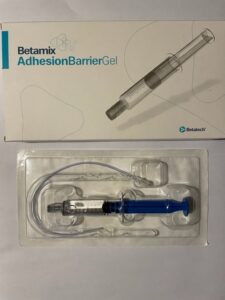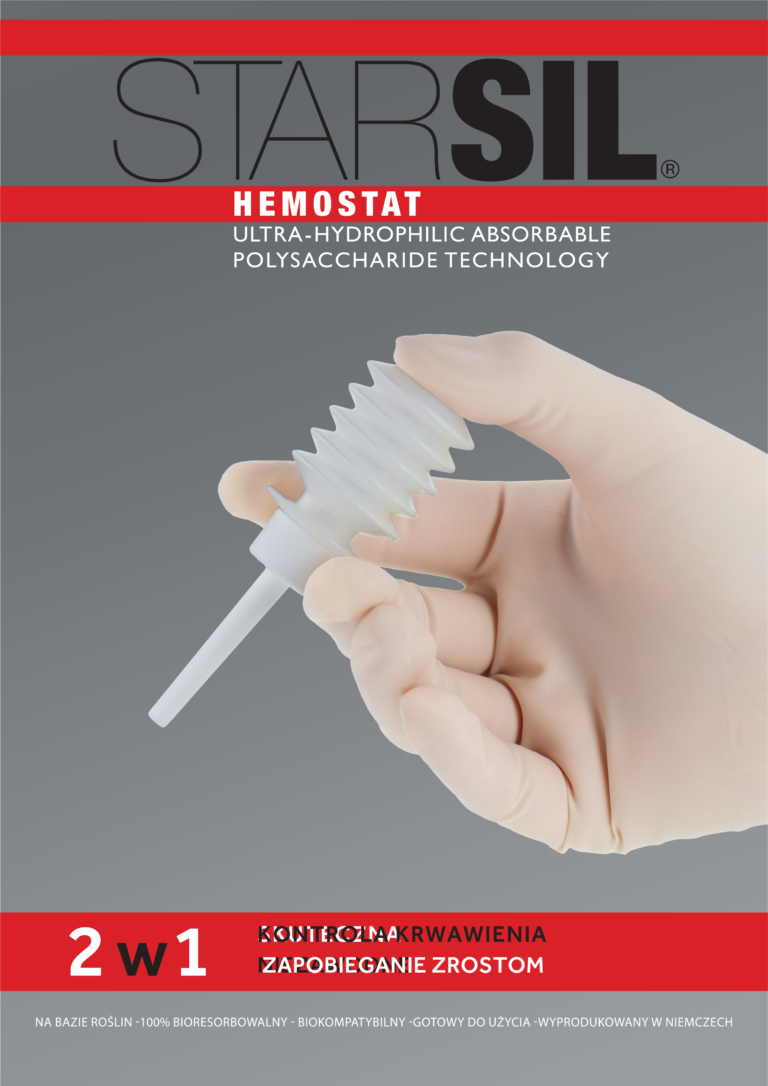SURGERY WITHOUT ADHESIONS!
WE SAY NO TO ADHESIONS! STOP ADHESIONS AND THEIR COMPLICATIONS!
We are a Polish pharmaceutical company whose goal is to build and expand awareness of adhesions in the medical environment and among patients, as well as promote effective and safe anti-adhesion preventive care.
Post-operative adhesions
Intraperitoneal and intrauterine complications, which are complications after surgical procedures, are one of the most common problems in surgical gynecology.
It is estimated that nearly 90% of patients with peritoneal adhesions underwent surgery in the past. The extent of the surgical procedure and the number of surgical interventions significantly increase the risk of adhesions.
Each operation, especially performed within the abdominal cavity and pelvis, is associated with the risk of postoperative adhesions. Adhesions are abnormal connections between tissues and internal organs. The internal organs and the inner wall of the abdominal cavity are covered with a thin membrane – the peritoneum. Even slight irritation, which occurs during normal laparoscopic procedures, can contribute to the formation of adhesions, which can lead to the gluing of tissues and organs that are not physiologically connected to each other.
The result of these abnormal connections (adhesions) are various ailments and dysfunctions of organs as well as chronic and recurrent pain in the lower abdomen. Peri-fallopian adhesions are the cause of infertility. Intrauterine adhesions are a separate issue. The uterine cavity is lined with mucous membrane, which plays a very important role in the implantation of pregnancy. Any intrauterine interventions, e.g. curettage of the uterus, may cause intrauterine adhesions.
Adhesions in the post-operative process can lead to serious complications in the form of:
Bowel obstruction
It is the most serious complication, which most often requires surgical treatment (repeat operation), releasing adhesions and restoring patency of the gastrointestinal tract
Gastrointestinal dysfunction
Associated with narrowing of the intestine, which causes bloating and pain.
Infertility
Adhesions located in the small pelvis and inside the reproductive organ (caesarean sections). Adhesions are the cause of 15-35% of infertility cases in women.
Methods of preventing post-operative adhesions
The use of an appropriate surgical method is always the basis of preventive care, and the best results are obtained by observing the principles of microsurgery – minimizing the manipulation of tissues, attention towards hemostasis, preventing the drying of the tissue, avoiding intraperitoneal infection, precise approximation of tissue planes, use of the least traumatizing surgical threads. Limiting traumatization can significantly reduce the risk of the formation of adhesions. Unfortunately, the appropriate surgical technique does not always guarantee full effectiveness in preventing adhesions, and that is why specialized products that prevent or significantly reduce adhesions should be used.
Our offer
Our offer includes anti-adhesive products in various forms and compositions, which are used in:
GYNECOLOGY
SPINE SURGERY
GENERAL SURGERY
ONCOLOGICAL SURGERY
VISCERAL AND TRANSPLANTATION SURGERY
PLASTIC SURGERY
CARDIOSURGERY
BREAST SURGERY
VASCULAR SURGERY AND THORACOSURGERY
MAXILLO-FACIAL SURGERY
ORTHOPEDICS AND TRAUMATIC SURGERY
ENT SURGERY
NEUROSURGERY
MINIMALLY INVASIVE SURGERY
Our products
Betamix Anti-adhesive Gel
Żel kwasu hialuronowego
Zapobiega zrostom
Całkowicie wchłanialny
Betamix to przezroczysty, płynny żel, który jest wskazany do zapobiegania powstawaniu lub zmniejszania zrostów pooperacyjnych. Betamix działa jako tymczasowa bariera ochronna oddzielająca tkanki i narządy podczas fazy regeneracji po zabiegu chirurgicznym i ogranicza zwłóknienie oraz redukuje powstawanie zrostów pooperacyjnych. Betamix składa się z kwasu hialuronowego, który występuje naturalnie w organizmie jako składnik tkanki łącznej, śródbłonkowej i nabłonkowej. Żel po umieszczeniu wewnątrz ciała pozostaje w miejscu aplikacji przez ok. 14 dni i chroni przed zrostami w okresie pooperacyjnym. Betamix nie jest pirogenny i nie zawiera żadnych barwników.

Zalety produktu:
- Gotowy do użycia z precyzyjnym aplikatorem
- Zapewnia dokładne pokrycie miejsca operowanego
- Bezbarwny, przezroczysty żel
- Zapobiega lub ogranicza tworzenie się zrostów
- Bezpieczny, naturalny i wchłanialny
- Szybka i łatwa aplikacja
- Korzystny stosunek jakości do ceny
- Nie wymaga specjalnych warunków przechowywania – temp. 10 °- 30 ° C
Betamix wskazania:
- chirurgia jamy brzusznej i miednicy
- chirurgia ścięgien i nerwów
- chirurgia kręgosłupa
Przechowywać w temperaturze 10 –30 °C
Dystrybutor: AgmaPharm tel. +48 506 080 022, +48 601 958 492, e-mail:biuro@agmapharm.pl
Starsil Hemostat
Hemostatic and anti-adhesive powder
If you are interested, please contact us at: biuro@agmapharm.pl
Feel free to contact us
Agmapharm Sp. z o. o.
30-384 Kraków, ul. Zalesie 25
REGON 524472012 NIP 676 26 36 550
© 2023 Projekt strony internetowej wykonany przez: home.pl
